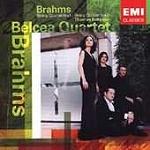The Belcea Quartet is a young ensemble that, on the evidence of this disc, has an affinity for Brahms’ often knotty chamber works. Its performance of the C minor quartet may lack the tonal and dynamic variety brought to it by groups like the Alban Berg Quartet and the Cleveland Quartet, both of which make a lot more of the Allegretto’s poco animato section and are more expressively lyrical in the Romanza, but the Belcea plays with the energy and tonal luster the work requires. Their Allegro first movement is full of thrustful drama, while their handling of transitions is skillful and their slight relaxations never break the piece’s intensity. In the subdued middle movements they capture much of the lyricism but seem more reined-in than necessary, disappointingly understated at times. They appear more comfortable in the energetic outer movements, though even there a bit more dramatic rhetoric wouldn’t have been out of place.
The Belcea’s C minor quartet is trumped by its performance of the Op. 111 Quintet, where the opening movement is executed with a welcome sense of easeful power and direction. The middle movements receive a balanced sonority and relaxed fluidity that suits the music wonderfully, especially since the players bring more pointed phrasing to the music than in the Quartet. The final movement has more than a few traces of the “Gypsy” style that Brahms often adopted for extroverted last movements, here done with plenty of finesse. The second viola is played by Thomas Kakuska of the Alban Berg Quartet, and we may surmise that his experienced presence may account for the wider dynamic range than we hear in the Quartet. EMI’s sound is adequate–but for presence, solid bass, and transparency, Telarc’s Cleveland Quartet recording of the Op. 51 is not matched here. The recording of the Quintet is the better engineered of the works on this disc; the cello is too recessed in the Quartet. [4/29/2004]
































